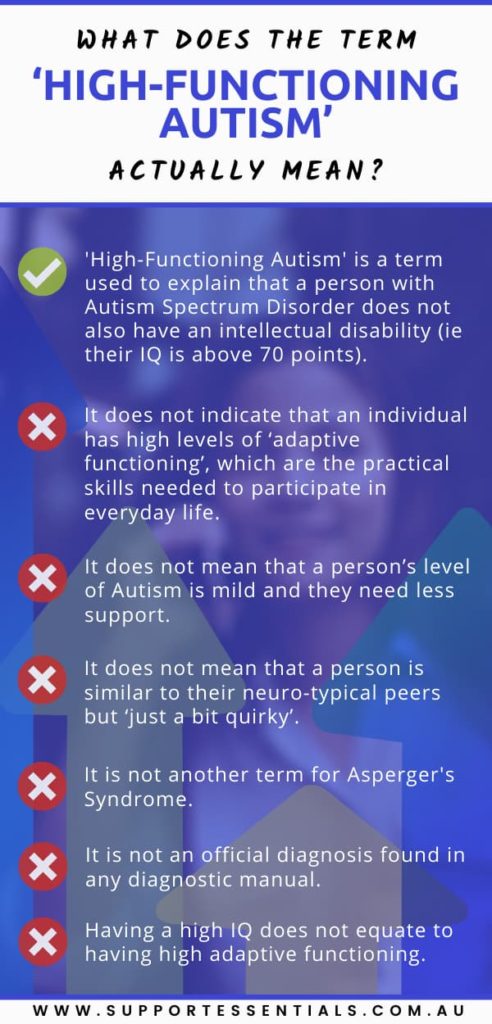The definition of ‘High Functioning Autism’
When you hear the term ‘High Functioning Autism’ what does it mean to you? What is your interpretation of it?
Most of us correctly assume that it refers to a person with Autism who functions at a higher level compared with someone who has Low-Functioning Autism.
But this then poses the question: a higher level of what?
Social skills? Life skills? Reading, writing and arithmetic? What exactly are we referring to here?
Another obstacle to accurately defining High Functioning Autism is the dynamic nature of it’s meaning across time and across the world.
Let’s take a look at the current (2020) definition of High Functioning Autism in Australia
What High Functioning Autism Means
High Functioning Autism is a term used to explain that a person with Autism Spectrum Disorder does not also have an intellectual disability.
The term refers solely to intelligence. An IQ of over 70 to be exact.
It is a simple clarification that the person with the ASD diagnosis does not have an IQ of 70 or below, which would qualify as Low-Functioning Autism.

What High Functioning Autism Does Not Mean
In order the clearly demonstrate the true meaning of High Functioning Autism, I believe it is also important to take a close look at what High Functioning Autism doesn’t mean.
Here is a list of necessary distinctions.
High Levels of Adaptive Functioning
Having High Functioning Autism does not indicate that an individual has high levels of ‘adaptive functioning’, which are the practical skills needed to participate in everyday life.
It is important to understand that having an average/above average IQ does not correlate to having average/above average adaptive functioning.
Individuals with High Functioning Autism will still struggle with adaptive skills especially with regards to socialising, communication and self-care.
A ‘Mild’ Case of Autism
High Functioning Autism does not mean that a person’s level of Autism is mild, and they can still do well with little support.
Autism is a recognised disability and all people with Autism require support. The Diagnostic and Statistical Manual of Mental Disorders (DSM-5), which is used in Australia to diagnose Autism Spectrum Disorder (ASD), specifies three support levels:
Level 1 – Requiring Support
Level 2 – Requiring Substantial Support
Level 3 – Requiring Very Substantial Support
Only the ASD levels 1, 2, and 3, as diagnosed by a qualified professional, should be used as an indicator of the amount of support a person with Autism needs.
That someone is ‘Quirky’
High Functioning Autism does not mean that a person is like their neuro-typical peers but ‘just a bit quirky’.
Dismissing High Functioning Autism as ‘just quirky behaviour’ fails to recognise the underlying difficulties people with High Functioning Autism face, plus the extraordinary effort they have to go to simply to appear ‘just quirky’ in the first place.
Another Term for Asperger’s Syndrome
High Functioning Autism is not another term for ‘Asperger’s Syndrome’. This is a tricky one as in the past the two terms were used interchangeably and today some clinicians still argue that they are one and the same.
An Asperger’s Syndrome profile is clearly distinguishable by the lack of clinically significant speech delay compared with a more ‘classic Autism’ profile which includes significant speech deficits.
However, it is possible to be of average or above average intelligence but also have significant speech deficits.
Therefore, while you could argue that every person who fits an Asperger Syndrome profile has High Functioning Autism, not all individuals with High Functioning Autism display an Asperger Syndrome profile.
An official diagnosis
High-Functioning Autism is not an official diagnosis and it is not found in any diagnostic manuals (such as the DSM-5, the key diagnostic manual for Autism in Australia).
It is important to remember that the official diagnosis is Autism Spectrum Disorder (with a specified level of 1, 2 or 3) and ‘High Functioning’ is simply a clarifying term sometimes added to state that no intellectual disability is present.

Has the definition of High Functioning Autism changed?
Yes, absolutely. There is a lot of confusion about the definition of High Functioning Autism and you may get a variety of definitions depending on who you ask.
Let’s take the internet for example.
Type ‘high functioning autism definition’ into the Google search engine and the first page of results is a mixed bag of definitions.
Here are four examples* I have chosen to illustrate the many differences you can find.
High-functioning autism (HFA) is autism without an intellectual disability (an IQ of 70 or less).
people with autism spectrum disorder who read, write, speak, and manage life skills without much assistance.
Although diagnosed formally with ASD, people with HFA often lead remarkably normal lives and have less difficulty assimilating into society than other ASD patients.
High-Functioning Autism specifically applies to children with autism who have an IQ of 70 or higher and exhibit milder symptoms. For example, these children exhibit fewer language delays, few to no cognitive deficits, and better spatial skills.
Alarmingly, some of these definitions include statements that I have included above in the What High-Functioning Autism Does Not Mean section.
It seems the term, High Functioning Autism, has had a range of additional qualifying statements attached to it that has skewed its original meaning and purpose.
The words used to make up the term also pose a problem. Some people do believe that High-Functioning Autism refers to having higher levels of adaptive functioning, and why not, when the definition of the words that make up the term could be used to argue this case.
The Future of the Term ‘High Functioning Autism’
The results of my google search were disappointing. Thankfully, nestled amongst these results was this article on the Autism Awareness Australia website titled “Why we should stop using the term ‘high functioning autism’…”
Their answer is simple and straight forward: “Intelligence is not a good estimate of functional levels in children diagnosed with autism”
The article goes on to explain how the meaning of High Functioning Autism has incorrectly evolved since it was coined in the 1980’s and is now so widely used in its incorrect form that it is having a negative impact on the supports people with High Functioning Autism receive.
By continuing to use this label, we may be inadvertently perpetuating a cycle that denies people access to services and support that they need, based solely on their IQ.
Dr Gail Alvares

What Can We Do to Correct the Misinformation Around High Functioning Autism?
While campaigning for the term High Functioning Autism to be replaced or abandoned may seem like a step in the right direction, the easiest way to correct the misinformation around the term High Functioning Autism is to simply start using the word correctly ourselves.
Gentle and kind correction of comments such as “It’s ok, he’s high functioning” and “Why worry about that? She’s high functioning, isn’t she?” is a great place to start.
Remember the tagline from the Autism Awareness Australia article? It can be used to form the perfect reply: “Well, you know that High Functioning Autism only means he/she is quite intelligent, but studies have shown that intelligence is not a good estimate of functional levels in children diagnosed with autism. He/she is still going to need a lot of support.”
Let the conversation flow from there and pat yourself on the back for kindly advocating for the correct definition of High Functioning Autism.
What do you think?
How has this article changed your perception of High-Functioning Autism?
Is it time to trade-in the term ‘High-Functioning Autism’ for something more indicative of its actual meaning?
Share your comment below.
*Please understand that I have not included the references for these definitions because the purpose of this exercise is to highlight differences that exist, not to vilify individual website publications.




